‘Day of mourning’: 200,000 Palestinian families lose UN food aid
By August, the WFP will be forced to suspend operations in the West Bank and Gaza if no funding is received.

Gaza – The message Aisha Abu Obeid received on her mobile in early May hit her like a thunderbolt. Her monthly food voucher from the United Nations World Food Programme (WFP), it said, would be stopped next month.
“I felt like my soul was leaving me,” said the mother of seven whose husband is unemployed. “This voucher used to cover my family’s monthly basic food needs. I look forward to it at the beginning of each month.”
Keep reading
list of 3 itemsNajwa, a Palestinian woman paralysed in Israel’s assault on Gaza
‘The war we know is better’: Palestinians leave Sudan for Gaza
For a year and a half, Aisha’s family had been receiving a food voucher from the WFP worth $108 per month, which covered their basic needs of food and vegetables. On May 11, the WFP announced in a statement that by June 200,000 people – almost 60 percent of the beneficiaries in Palestine – will no longer be receiving food assistance due to a severe funding shortage.
The funding crunch has already forced WFP to cut cash assistance by about 20 percent this month. And by August, the agency will be forced to suspend operations in the occupied West Bank and Gaza if no funding is received.
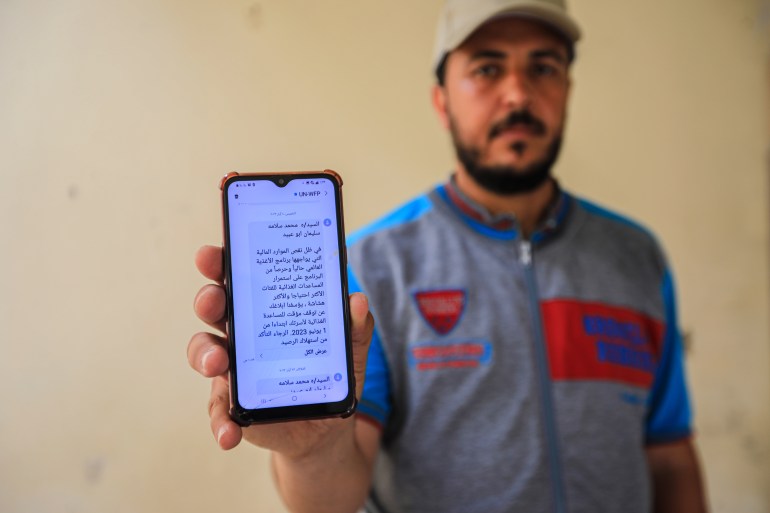
“Desperate times call for desperate measures,” Samer Abdeljaber, WFP representative and country director in Palestine, told Al Jazeera. “We have no option but to stretch the limited resources we have to ensure that the needs of the most vulnerable families are met. They will go hungry without food assistance.”
He said the WFP urgently needs $51m to maintain its aid in Palestine until the end of the year. For families like Aisha’s, that help is a lifeline central to their survival amid a storm of never-ending crises linked to Israel’s illegal occupation of the Gaza Strip and the West Bank.
A few days after she received the WFP alert on her phone, Aisha’s house was destroyed in the latest escalation in the Gaza Strip. On May 13 afternoon, she was sitting with her children when she heard screams outside the house calling for neighbours to evacuate their houses.
“I was very terrified and went out to see our relatives leaving their homes. They told me that the house opposite to us had been warned to be bombed,” she recalled. “I immediately gathered my children and we fled to our relatives’ house.”
After the house was bombed, Aisha, her husband, and their children returned home to find it largely reduced to rubble.
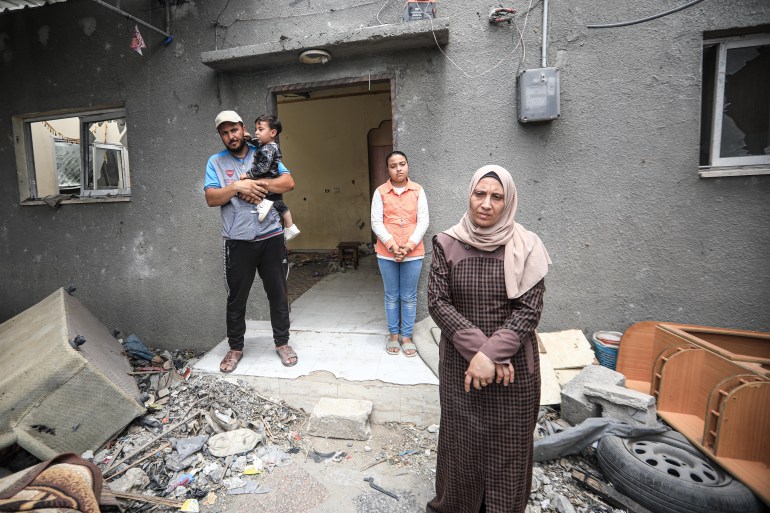
‘The world has shrunk’
“I feel so heartbroken,” Aisha said, tears in her eyes. “I feel that the world has shrunk in front of our faces. We have no source of income, and we lost the food voucher, which barely covered my children’s food needs … and now we’re losing our house.”
Over the course of 14 years of marriage, Aisha said what saddens her the most is her inability to even plan for the future of her children. “We are busy here with securing a living day by day. There is no room for the future.”
“Where are we going with ourselves in this life,” she asked, her voice angry.
Aisha is a history graduate and her husband Suliman holds a degree in psychological counselling. But finding good jobs in Gaza is almost as hard as finding affordable food for the family. The unemployment rate stands at 45.3 percent and two out of every three people struggle to afford food.
“There are no job opportunities for young people and graduates,” said Suliman, 37, who is now trying to find part-time work in construction, carpentry or as a porter. “Whenever there is an opportunity.”
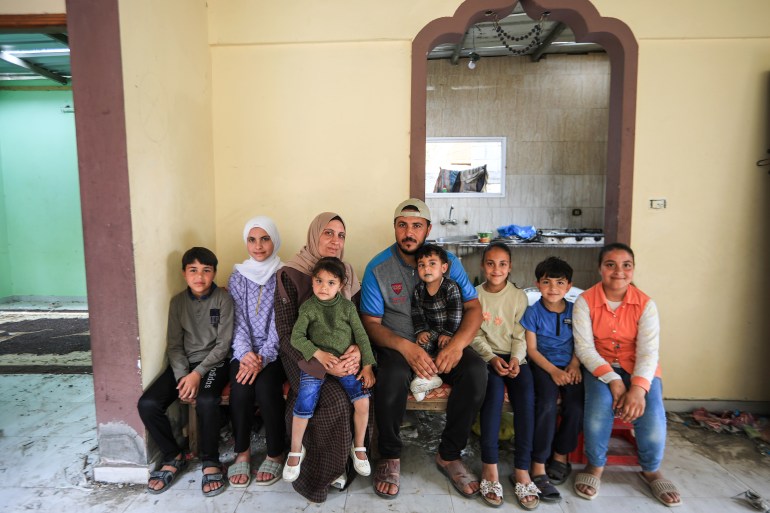
“I hope this threatening decision will be considered,” Aisha said. “I almost go crazy when I think about how I can feed my seven children.”
Aisha and her family are currently living in a rented house until their home gets renovated. “We left our house with only our clothes. We lost all our furniture and belongings,” Suliman said.
“Welcome to life in Gaza,” he said. “When hunger, poverty and war come together.”

It is a sentiment echoed by the WFP in its May statement, which said, “Vulnerable families in Gaza and the West Bank have been pushed to the limits by the combined effects of growing insecurity, a deteriorating economy, and the rising cost of living that is driving food insecurity up.”
It said 1.84 million Palestinians, or 35 percent of the population, did not have enough food.
“We urge government donors and the private sector to continue their support to WFP during this difficult time,” said Abdeljaber. “Continued donor support has allowed us to provide a lifeline to Palestinians as well as build sustainable food solutions in Palestine. We need now, more than ever, to ensure that work does not stop.”
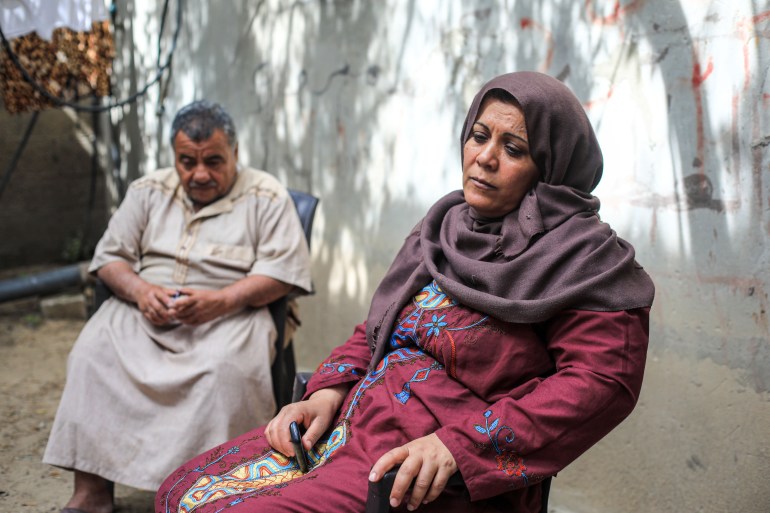
‘Day of mourning’
In a dilapidated house in Jabalia camp in the northern Gaza Strip, Samah al-Qanou is still coming to terms with the “shocking” message she received, informing her that her monthly food voucher had been cut off.
“I’d been receiving this voucher for 10 years. It relieved me of the burden of providing basic food every month,” said al-Qanou, 45, who lives with her 66-year-old husband, who is sick, and four children.
She waits impatiently for the coupon, worth about $75, to come in at the start of every month. She goes early in the morning to encash it at the supermarket next to her house. “Receiving the letter was a day of mourning for me,” she told Al Jazeera. “I spent the whole day crying and my blood pressure spiked.”
Al-Qanou said she has been unable to finance college education for her children “despite their intelligence”. Without university education, the children earn less than $100 a month.
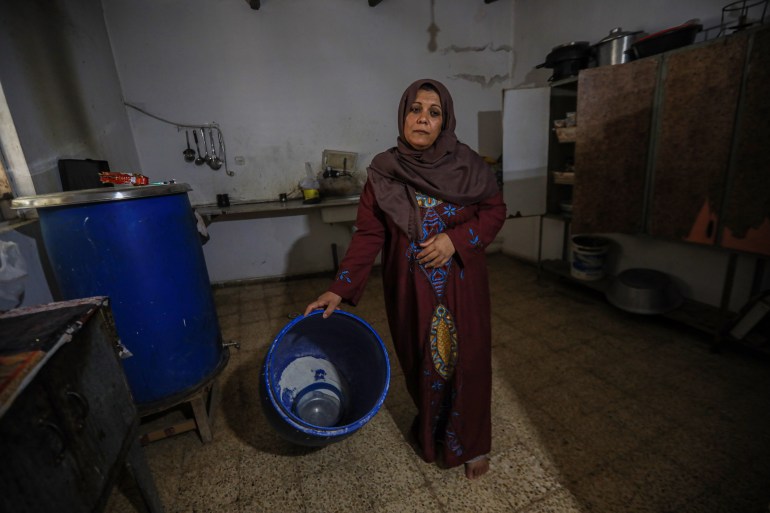
“At least with the voucher, I have the minimum basic needs covered in my house,” she said, pointing to the barrel of flour that is about to run out. “But what should I do today? How will I feed my family?”
“Sometimes I think it would be better if we all died.”